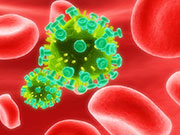Doctors pinpoint why Mississippi child who appeared free of HIV suffered relapse
THURSDAY, Feb. 19, 2015 (HealthDay News) — All babies born with HIV should receive the same rapid medical response as the young Mississippi girl born with the virus who suffered a disappointing relapse last July, despite the fact that the virus later reappeared, according to a letter published in the Feb. 19 issue of the New England Journal of Medicine.
The girl, now nearly 5 years old, remained apparently virus-free for roughly two years after starting on a combination of three antiretroviral drugs within 30 hours of her birth. Her remission continued even though she stopped taking HIV medications when she was 18 months old. Doctors had hoped her remission would open the door to a functional cure for all children born with the virus. They now know that the girl’s HIV was dormant all that time — not simply percolating undetected — because tests have shown that her recurring virus was an exact match to her mother’s HIV, the girl’s pediatrician, Hannah Gay, M.D., of the University of Mississippi Medical Center in Jackson, told HealthDay.
Doctors should not assume that a child is HIV-free because they cannot detect any virus in their blood, Gay stressed. “As we’ve studied this case and tried to describe her, we’ve developed a vocabulary of ‘remission’ rather than ‘functional cure,'” Gay said. “We think probably ‘remission and rebound’ or ‘remission and relapse’ are better and more communicative than ‘functional cure.'”
Since the virus can hide so well, children born with HIV need to keep taking antiretroviral medication even if they appear virus-free, Katherine Luzuriaga, M.D., a professor of molecular medicine and pediatrics at the University of Massachusetts Medical School in Worcester and lead author of the NEJM letter, told HealthDay. “What this and other cases tell us is our current efforts are not enough to prevent the formation of that reservoir of HIV in the body, or drop it low enough that patients can remain off antiretrovirals indefinitely,” she said.
Full Text
Copyright © 2015 HealthDay. All rights reserved.








